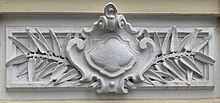
Back Картуш (архітэктура) Byelorussian Картуш (архітэктура) BE-X-OLD Картуш (изкуство) Bulgarian Cartel·la (adorn) Catalan Kartuš Czech Kartusche (Kunst) German Kartuŝo (arto) Esperanto Cartela (tarjeta) Spanish Kartušš Estonian Kartussi (taide) Finnish
This article contains an unencyclopedic or excessive gallery of images. |

A cartouche (also cartouch) is an oval or oblong design with a slightly convex surface, typically edged with ornamental scrollwork. It is used to hold a painted or low-relief design.[1] Since the early 16th century, the cartouche is a scrolling frame device, derived originally from Italian cartuccia. Such cartouches are characteristically stretched, pierced and scrolling.
Another cartouche figures prominently in the 16th-century title page of Giorgio Vasari's Lives of the Most Excellent Painters, Sculptors, and Architects, framing a minor vignette with a pierced and scrolling papery cartouche.
The engraved trade card of the London clockmaker Percy Webster shows a vignette of the shop in a scrolling cartouche frame of Rococo design that is composed entirely of scrolling devices.
- ^ Ching, Francis D. K. (1995). A Visual Dictionary of Architecture. New York: John Wiley and Sons. p. 183. ISBN 0-471-28451-3.